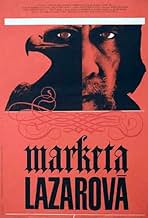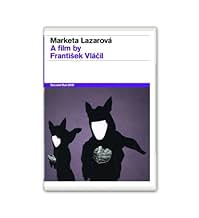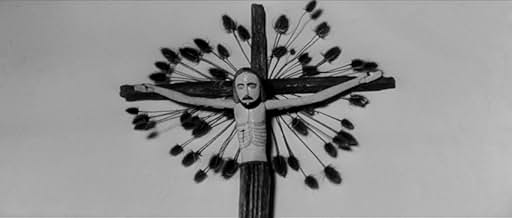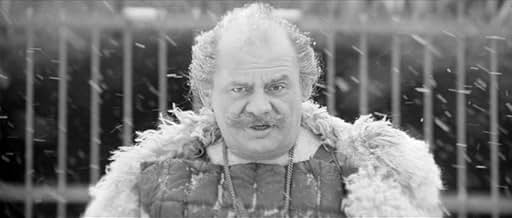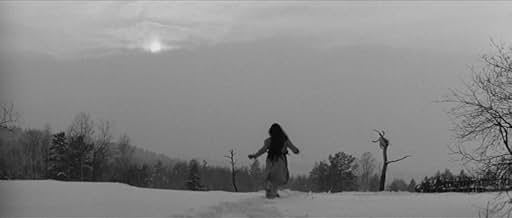CALIFICACIÓN DE IMDb
7.8/10
6.5 k
TU CALIFICACIÓN
Un retrato sombrío del cambio del paganismo al cristianismo en la Europa central medieval.Un retrato sombrío del cambio del paganismo al cristianismo en la Europa central medieval.Un retrato sombrío del cambio del paganismo al cristianismo en la Europa central medieval.
- Dirección
- Guionistas
- Elenco
- Premios
- 2 premios ganados y 2 nominaciones en total
- Dirección
- Guionistas
- Todo el elenco y el equipo
- Producción, taquilla y más en IMDbPro
Opiniones destacadas
"Marketa Lazarova" was a film I saw in 1970 at a small film theater in Minneapolis, Minnesota. It left an indelible memory, and I've spent years trying to find a way to see it again. At least once a year, I find a note I left about a phone call I've made to some obscure library or other such place in the hope of finding a way to see it.
The film won an Academy Award, and it should be remembered. It is stunning in black and white; the story is remarkable in its content and direction.
If anyone has ideas about how we fans can possibly revive this movie, we should try to do so. It is worth all the trouble and more just to see it again and again.
The film won an Academy Award, and it should be remembered. It is stunning in black and white; the story is remarkable in its content and direction.
If anyone has ideas about how we fans can possibly revive this movie, we should try to do so. It is worth all the trouble and more just to see it again and again.
I've only seen this movie once, in a restored print at a film festival a few years back; it's apparently not available on video in the US, which is a real shame. It's a medieval epic, basically about the clash between the old pagan world and the emerging Christian one, but there's a lot more to it than that. Visually, it's nearly as stunning as *Andrei Rublev* (and a good bit faster-paced); some of the images - wolves roaming the barren forests, horsemen in snowstorms - will make the hairs on the back of your neck stand up. I'll admit that I'm a sucker for gloomy, wintry European art movies, especially if they work some bloody sword-fights in, too, but this is one of the overlooked Great Movies ...
UK DVD label Second Run which specializes in rare Eastern European classics have, over the last couple of years, released a handful of films I have long yearned to watch (and which, as a result of this viewing of MARKETA LAZAROVA, I've just ordered online): Aleksander Ford's KNIGHTS OF THE TEUTONIC ORDER (1960; a disc which despite its being trimmed by the BBFC and in an altered aspect ratio, I couldn't sensibly forego), Jerzy Kawalerowicz's MOTHER JOAN OF THE ANGELS (1961; their very first release which I purchased in London last year), Jan Nemec's THE PARTY AND THE GUESTS (1966) and, debuting in a few days' time, Miklos Jancso's THE ROUND-UP (1965).
Unlike these movies, I wasn't consciously aware of MARKETA LAZAROVA when the infectious buzz about its impending release hit the Internet but, as I later found out, the film was actually mentioned, ever so fleetingly, in one of my father's old movie magazines. Again, when the DVD was eventually released, there was a negative vibe about the alleged visual deficiencies of Second Run's disc but, in hindsight, these were quite needlessly exaggerated. Ultimately, an awesome and, as it turned out, essential movie experience such as this one deserves to be seen right away and to keep waiting for that perfectly pristine print to rear its unlikely head is utterly pointless. Alas, the Czech New Wave is still a largely undiscovered segment of cinema history for me so I am not in a position to suitably assess whether MARKETA LAZAROVA is indeed the greatest Czech movie ever made (as it had been judged in a 1998 poll among 100 native film critics). Suffice it to say that this ostensibly obscure film has by now figured in a number of published all-time best polls and, consequently, its status is deservedly well-established. Hopefully, as it was in my case, Second Run's DVD will serve as the introduction to many an adventurous film enthusiast in the future
Since my overall experience of MARKETA LAZAROVA was such a positive one, it seems only right to get my quibbles with the film out of the way first and there are basically two of them: a muddled storyline which, for most of the film's first half, left me rather perplexed as to which of the two warring factions the characters whose exploits I was following on screen belonged and, while things got clearer as time went by, the individuals themselves (with the obvious exception of the titular character) did not exactly garner much sympathy. I suppose that for a movie with a running time of almost three hours these flaws would usually be significantly detrimental to one's enjoyment of the whole: however, the definite impression I was left with while watching was that, despite the eponymous title, the director's intent was not to narrate a conventional life history but actually to create a visual tapestry of the medieval era onto celluloid and, in this regard, to say that he succeeded would be the understatement of the year. In fact, along with Andrei Tarkovsky's ANDREI RUBLEV (shot in 1965 but actually unreleased until 1972), I'd venture to say that MARKETA LAZAROVA is the most convincingly realized cinematic portrait of those turbulent times, distinguishing Frantisek Vlacil's vision as an overwhelmingly expansive and stunningly visual one.
In this context, it is quite appropriate that the titular character (played by a future Presidential candidate, the beautiful Magda Vasaryova) is practically silent for most of the film; she is first seen about to enter into a holy order but is eventually abducted, raped and impregnated by the feral Mikolas (who was actually raised by wolves) whom she comes to love eventually. Another parallel and equally unlikely relationship we are witness to is the one which blossoms between the earthy Alexandria (who is also involved in some brief but startling instances of full-frontal nudity) and her young, aristocratic captive who happens to be a German Bishop; it is worth noting here that Alexandria had already almost cost the life of her brother Adam when his own father had severed his arm in punishment for their incestuous coupling! Interestingly, the film is divided into two parts respectively entitled "Straba" and "The Lamb Of God" and punctuated by frequent, verbose, half Dickensian-half picaresque chapter headings, not to mention the presence on the soundtrack of a bemused narrator who, at one point, even takes on the role of God while interacting with a monk! This is not the only instance of whimsical inventiveness present in MARKETA LAZAROVA perhaps adopted by the director to counter the oppressively bleak ambiance created by the forbidding snowy landscape and dense forest settings which can actually claim to be the film's true main characters. As I said previously, striking images abound throughout: the intermittent, sinister appearance of the pack of wolves is impressively eerie, the distraught monk looking for his lamb and eventually losing her decapitated head down a clifftop, a horse drowning in a puddle on a deserted no man's land, the camera occasionally taking on a feverishly first person viewpoint according to the character at hand, the effective use of unheralded off-kilter compositions (including a totally bizarre arrow-in-the-eye shot!), etc. Having said that, Zdenek Liska's choral, percussive and electronic score is equally imaginative and, as a result, extraordinarily complementary to the uniquely sombre spectacle on constant display.
Unlike these movies, I wasn't consciously aware of MARKETA LAZAROVA when the infectious buzz about its impending release hit the Internet but, as I later found out, the film was actually mentioned, ever so fleetingly, in one of my father's old movie magazines. Again, when the DVD was eventually released, there was a negative vibe about the alleged visual deficiencies of Second Run's disc but, in hindsight, these were quite needlessly exaggerated. Ultimately, an awesome and, as it turned out, essential movie experience such as this one deserves to be seen right away and to keep waiting for that perfectly pristine print to rear its unlikely head is utterly pointless. Alas, the Czech New Wave is still a largely undiscovered segment of cinema history for me so I am not in a position to suitably assess whether MARKETA LAZAROVA is indeed the greatest Czech movie ever made (as it had been judged in a 1998 poll among 100 native film critics). Suffice it to say that this ostensibly obscure film has by now figured in a number of published all-time best polls and, consequently, its status is deservedly well-established. Hopefully, as it was in my case, Second Run's DVD will serve as the introduction to many an adventurous film enthusiast in the future
Since my overall experience of MARKETA LAZAROVA was such a positive one, it seems only right to get my quibbles with the film out of the way first and there are basically two of them: a muddled storyline which, for most of the film's first half, left me rather perplexed as to which of the two warring factions the characters whose exploits I was following on screen belonged and, while things got clearer as time went by, the individuals themselves (with the obvious exception of the titular character) did not exactly garner much sympathy. I suppose that for a movie with a running time of almost three hours these flaws would usually be significantly detrimental to one's enjoyment of the whole: however, the definite impression I was left with while watching was that, despite the eponymous title, the director's intent was not to narrate a conventional life history but actually to create a visual tapestry of the medieval era onto celluloid and, in this regard, to say that he succeeded would be the understatement of the year. In fact, along with Andrei Tarkovsky's ANDREI RUBLEV (shot in 1965 but actually unreleased until 1972), I'd venture to say that MARKETA LAZAROVA is the most convincingly realized cinematic portrait of those turbulent times, distinguishing Frantisek Vlacil's vision as an overwhelmingly expansive and stunningly visual one.
In this context, it is quite appropriate that the titular character (played by a future Presidential candidate, the beautiful Magda Vasaryova) is practically silent for most of the film; she is first seen about to enter into a holy order but is eventually abducted, raped and impregnated by the feral Mikolas (who was actually raised by wolves) whom she comes to love eventually. Another parallel and equally unlikely relationship we are witness to is the one which blossoms between the earthy Alexandria (who is also involved in some brief but startling instances of full-frontal nudity) and her young, aristocratic captive who happens to be a German Bishop; it is worth noting here that Alexandria had already almost cost the life of her brother Adam when his own father had severed his arm in punishment for their incestuous coupling! Interestingly, the film is divided into two parts respectively entitled "Straba" and "The Lamb Of God" and punctuated by frequent, verbose, half Dickensian-half picaresque chapter headings, not to mention the presence on the soundtrack of a bemused narrator who, at one point, even takes on the role of God while interacting with a monk! This is not the only instance of whimsical inventiveness present in MARKETA LAZAROVA perhaps adopted by the director to counter the oppressively bleak ambiance created by the forbidding snowy landscape and dense forest settings which can actually claim to be the film's true main characters. As I said previously, striking images abound throughout: the intermittent, sinister appearance of the pack of wolves is impressively eerie, the distraught monk looking for his lamb and eventually losing her decapitated head down a clifftop, a horse drowning in a puddle on a deserted no man's land, the camera occasionally taking on a feverishly first person viewpoint according to the character at hand, the effective use of unheralded off-kilter compositions (including a totally bizarre arrow-in-the-eye shot!), etc. Having said that, Zdenek Liska's choral, percussive and electronic score is equally imaginative and, as a result, extraordinarily complementary to the uniquely sombre spectacle on constant display.
Just wanted to add a note about the apparent slightly negative comments about the visual quality of the Second Run DVD release - well, how petty can you get! This astonishing film is incredible to look at and is surely one of the most beautiful films ever made though not, it has to be said, in a conventional sense. Although some scenes feature genuinely authentic brutality, there is a strange dream-like quality to the film's look. The story itself demands total concentration throughout but, by the end, you will be fully rewarded for your efforts. A poetic masterpiece. Great work again by Second Run for making such a cinematic rarity available to view.
Man was a beast before the Middle Ages, but now it was one racked with guilt. Violence was the constant and would continue to be the shaper of worlds but, with the advent of this new religion preaching mercy and penitence, it was probably the first time that this violence was experienced within unprecedented, new frameworks. What had been passed through the blood for centuries in the Teutonic woods as the only means of arranging the world in some order, this instinctive violence, was now felt to be abominable.
In this sense, the religious angst of the medieval man comes from trying to conciliate that ancestral world where carving a blood eagle on the back of a fallen chieftain pleased the gods, with the new ideas of perceiving it, where sins had to be atoned for.
Here we get the tumultuous chronicle of this, the writing of the middle part of history.
We get baroque, medieval art, steeped in religious terror and ancestral guilt. Chances are there's a slew of medieval films out there, but probably not one that is as pungent, with a single exception. We encounter this cruel, pitiless hell on earth where life is meaningless and crazed gods roaming it exact terrible, ironic tolls on the human soul, ten years later in Diabel, by the hand of a certified madman this time.
Spiritually I couldn't be farther apart from this godless vision of tortured human beings, essentially Christian. But as an experience to dwell upon and inhabit, the film offers no quarter. It's a better Valhalla Rising, thirty years before.
What new frameworks here though, how best to experience the torture of the medieval man? The director finds the answer in the Czech New Wave.
The intertitle that opens this delineates what follows as a saga, an epic story of murder and intrigue. The masterstroke here lies in how this saga is told, in fragmenting it from a linear notion where time is a succession (which is the artifice of history) and presenting us with those fragments as a vivid experience of a life bled for and anguished. Which is to say, Marketa Lazarova is not the history of what transpired but the memory of it, which is then arranged into a story.
The camera then sees inside this story deeper than any bard did. And what it sees is that these passions and sufferings are not linear, therefore building up to something or anticipated to come to an end that would justify the pain, but an exponential cycle turning indifferently and without pattern.
Yet here is where the film falters. Having broken this up, the film shies away from the opportunity to look directly at what hides behind it, if anything, and insists we read this as a rhapsody where it's not impossible to consider the degenerate as cruel, flawed heroes who defied the king's rule. Bombastic music swells up in crescendos now and then to remind us that all this is horrible, but fundamentally tragic.
This may be a quibble however. It's a harrowing experience watching these men, small and insignificant at the face of violence, struggle with a pain and madness immemorial, that predates their existence. Omens of skaldic doom abound here, black crows in the bony branches of trees. Whatever they signify or not, whether the gods cackle at all this or are indifferently absent, these sights curdle the blood.
In this sense, the religious angst of the medieval man comes from trying to conciliate that ancestral world where carving a blood eagle on the back of a fallen chieftain pleased the gods, with the new ideas of perceiving it, where sins had to be atoned for.
Here we get the tumultuous chronicle of this, the writing of the middle part of history.
We get baroque, medieval art, steeped in religious terror and ancestral guilt. Chances are there's a slew of medieval films out there, but probably not one that is as pungent, with a single exception. We encounter this cruel, pitiless hell on earth where life is meaningless and crazed gods roaming it exact terrible, ironic tolls on the human soul, ten years later in Diabel, by the hand of a certified madman this time.
Spiritually I couldn't be farther apart from this godless vision of tortured human beings, essentially Christian. But as an experience to dwell upon and inhabit, the film offers no quarter. It's a better Valhalla Rising, thirty years before.
What new frameworks here though, how best to experience the torture of the medieval man? The director finds the answer in the Czech New Wave.
The intertitle that opens this delineates what follows as a saga, an epic story of murder and intrigue. The masterstroke here lies in how this saga is told, in fragmenting it from a linear notion where time is a succession (which is the artifice of history) and presenting us with those fragments as a vivid experience of a life bled for and anguished. Which is to say, Marketa Lazarova is not the history of what transpired but the memory of it, which is then arranged into a story.
The camera then sees inside this story deeper than any bard did. And what it sees is that these passions and sufferings are not linear, therefore building up to something or anticipated to come to an end that would justify the pain, but an exponential cycle turning indifferently and without pattern.
Yet here is where the film falters. Having broken this up, the film shies away from the opportunity to look directly at what hides behind it, if anything, and insists we read this as a rhapsody where it's not impossible to consider the degenerate as cruel, flawed heroes who defied the king's rule. Bombastic music swells up in crescendos now and then to remind us that all this is horrible, but fundamentally tragic.
This may be a quibble however. It's a harrowing experience watching these men, small and insignificant at the face of violence, struggle with a pain and madness immemorial, that predates their existence. Omens of skaldic doom abound here, black crows in the bony branches of trees. Whatever they signify or not, whether the gods cackle at all this or are indifferently absent, these sights curdle the blood.
¿Sabías que…?
- TriviaFrantisek Vlácil not only had the clothes painstakingly researched and hand-sewn, he had the cast live in the forest for the two years of shooting so they could get into the 13th century mindset.
- ErroresIn a scene where Marketa observes a reindeer in the forest, you can see a director Frantisek Vlácil in jacket in the left of the frame. He was actually trying to scare deer, because they didn't want to move. This could be seen only on some of the Blu-Ray and DVD versions.
- Versiones alternativasThe UK release was cut, a cut was required to remove sight of a snake being stabbed and rearing up in pain, in order to obtain a 15 classification. The cut was made on the basis of BBFC policy on genuine animal cruelty. An uncut classification was not available.
- ConexionesEdited into CzechMate: In Search of Jirí Menzel (2018)
Selecciones populares
Inicia sesión para calificar y agrega a la lista de videos para obtener recomendaciones personalizadas
- How long is Marketa Lazarová?Con tecnología de Alexa
Detalles
- Tiempo de ejecución
- 2h 42min(162 min)
- Color
- Mezcla de sonido
- Relación de aspecto
- 2.35 : 1
Contribuir a esta página
Sugiere una edición o agrega el contenido que falta

![Ver Trailer [OV]](https://m.media-amazon.com/images/M/MV5BOGZhMmFmMGQtNGZhMi00M2QzLWExMjItZjJkZTVhMmEzYzJjXkEyXkFqcGdeQXRyYW5zY29kZS13b3JrZmxvdw@@._V1_QL75_UX500_CR0)
